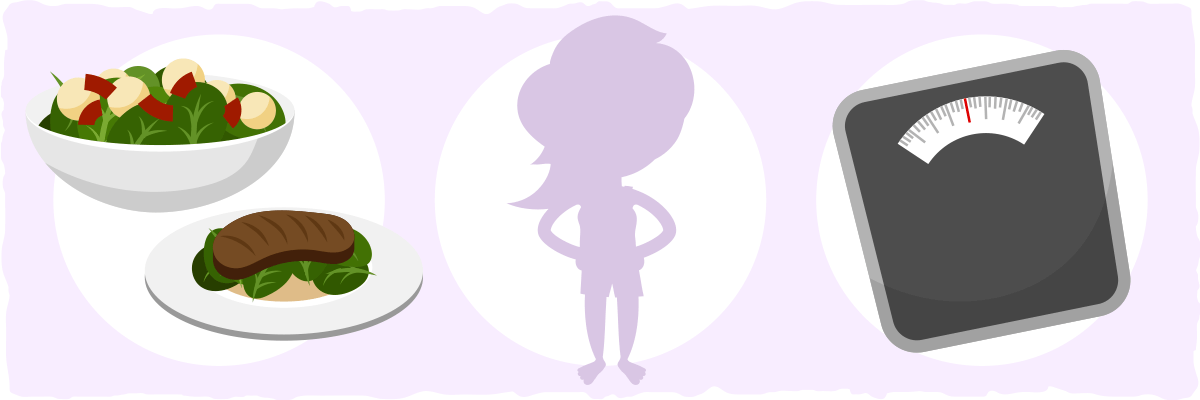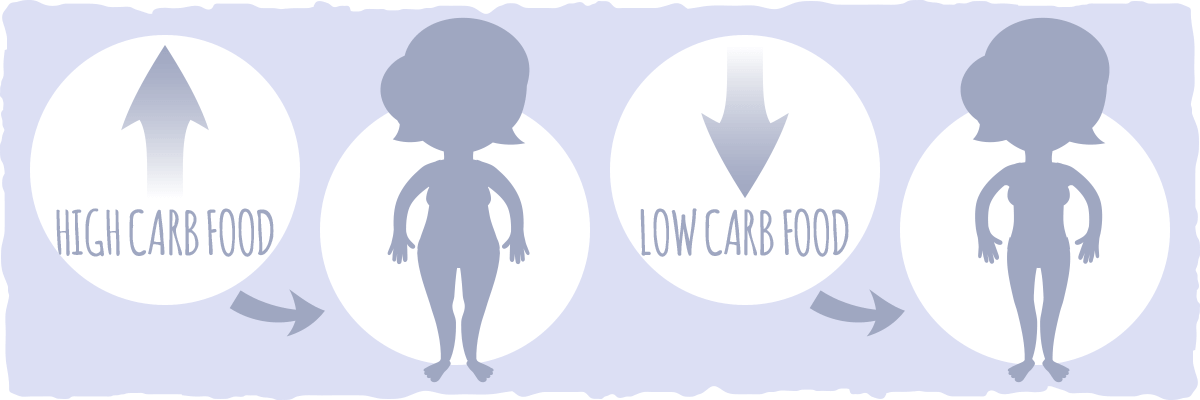Calorie counting is a good device for individuals to make use of to get a tough thought of caloric intakes, in addition to a method to pinpoint errors they could have made in the event that they hit a plateau. This will elevate the query, “What number of energy ought to I eat on keto?” Nicely, that relies upon…
You may need been advised that counting energy just isn’t wanted on a ketogenic eating regimen as a result of it causes extra weight reduction than different diets. That’s not precisely true. Would you be burning extra energy than a low-fat eating regimen? Most definitely, however that’s due to your protein consumption.
What about excessive carb vs. low carb? The reality is, there aren’t any research that correctly present a fats loss benefit between low carb and excessive carb diets.
There have been over 20 long-term research achieved within the final 50 years attempting to present a strong conclusion on this, however the entire outcomes have been the identical: there is no such thing as a important distinction in weight reduction between a low carb and excessive carb eating regimen. [1][2][3]
Keto Energy: The Ketogenic Weight-reduction plan and How This Ties In
The factor a few ketogenic eating regimen is if you happen to inform individuals to eat as a lot as they need, they may are likely to eat barely lower than different diets. Naturally, you’ll eat much less if you happen to’re consuming meals that may satiate you simpler.
You’ll have extra fullness from greens, satiety from protein, really feel fuller for longer from the fats, and endure greater ranges of thermogenesis from unprocessed meals.
So what does that every one imply? In a nutshell, it implies that you’ll eat much less meals and subsequently fewer energy. Your physique can dig into your fats shops, because you’re naturally limiting energy, and you’ll shed weight.
With excessive carb diets, often with an excellent quantity of processed meals, you will notice swings in blood glucose.


This makes it straightforward for individuals to present in to cravings, and succumb to the “carb habit” created from serotonin and dopamine. There aren’t any magical metabolic benefits to a ketogenic eating regimen. However, the small advantages that make it simpler on us can be the explanation that it really works.
- Weight reduction on a excessive carb eating regimen: energy decide the fats loss.
- Weight reduction on a standard carb eating regimen: energy decide the fats loss.
- Weight reduction on a ketogenic eating regimen: energy decide the fats loss.
- Weight achieve on a excessive carb eating regimen: energy decide the fats achieve.
- Weight achieve on a standard carb eating regimen: energy decide the fats achieve.
- Weight achieve on a ketogenic eating regimen: there’s no scientific knowledge.
If solely there was some form of sample right here. Keto would possibly be magic, however so far as I do know there aren’t any research that help this concept. The scientific consensus is that consuming an excessive amount of will make you fats.
Energy In vs. Energy Out: A Fundamental Overview


Remember that the fundamental calorie in/calorie out formulation is strictly that – fundamental. If you’re speaking in a practical perspective, the formulation stays true however you must modify the calorie expenditure for metabolic charges, exercise ranges, effectiveness of ones endocrine system, and many others. The essential formulation is:
Power saved = power in – power out
Say your physique wants 1800 energy, and also you solely eat 1300 energy. Weight reduction will happen as a result of your physique makes use of roughly 500 energy of physique fats to cowl the lacking 500 energy out of your eating regimen:
Power saved = power in – power out
-500 = 1300 – 1800
This results in a theoretical weight lack of 1 lb per week (3500 kcal per pound of fats). If you happen to ate 1300 energy on keto and misplaced 2 lbs in per week, you’d have to make use of 1000 energy from fats shops. That implies that 1000 energy of expended power are exterior of your eating regimen a day, for 7 days. If that isn’t the case, the formulation doesn’t work.
Power saved = power in – power out
-1000? = 1300 – 1800
This fails fundamental arithmetic.
It simply doesn’t work in math, and it additionally doesn’t work in physics. So for keto, or any eating regimen for that matter, to result in extra weight reduction – you must get to a better power expenditure of energy for it to carry true. This implies rising your metabolic fee, rising exercise ranges, and many others.
Power saved = power in – power out
-1000 = 1800 – 2800
So, what number of energy do you have to truly eat? Nicely clearly that will likely be completely different from individual to individual primarily based on present weight and the present state of their endocrine system. To be brief, you by no means need to go right into a caloric deficit that’s decrease than your fats shops can deal with.
What number of energy are coated by your fats shops? I went into extra depth on this in a earlier article, however you will get about 31.4 energy per pound of fats per day. Which means if you happen to’re 220 lbs (162 lean mass , 58 lbs fats) you will get about 1821 energy from fats shops.
Self-Reported Research Debunked
There are a selection of self-reported research that folks have been utilizing to “debunk” the entire calorie-in vs. calorie-out debate.
The issue with these is that they’re often misconstrued and presenting incorrect data.
We’d check out Volke’s examine, which is free-living and self-reported. It’s a short-term examine that solely allowed 21 complete days to be counted, the place the induction time of ketosis would cowl half of the time the examine was carried out.
James Krieger additionally revealed a meta-analysis of low-carbohydrate and weight reduction which he has since claimed is unreliable and almost definitely mistaken. Because the data and science enhance, our perspective is altering.
The Argument that Energy are Poorly Derived
Some might argue that the calorie is a poorly derived unit of power, which additionally poorly interprets throughout carbohydrates, fat, and proteins.
This merely isn’t the case. We perceive how cell respiration works, and there are quite a few research on the way it works.
Let’s check out how we discovered these values:
- Digestible fiber is 2 energy per gram
- Carbohydrates are 4 energy per gram
- Protein is 4 energy per gram (with 20% thermic impact)
- Fat are 9 energy per gram
Counting energy has proven to be correct. There’s a big database that exists on the power expenditure. This examine reveals that the power expenditure is definitely much like the suggestions adopted by FAO and WHO.
These suggestions have been adopted as a result of research have been achieved on these models, and confirmed that these are good approximate values for human digestion and utilization.
The Argument that We Excrete Extra Vitamins
Some persons are saying that we’ll excrete extra vitamins if we don’t use them – when it comes to protein and fat. This examine reveals that we’ll solely excrete about 3 grams of fats once we eat 2800 energy a day (50% being from fats).
One other examine reveals that over a 14 day window and a number of diets (excessive fats, low fats, hunger, overfeeding, and many others.) the quantity of vitamins misplaced from excretion is simply about 4% of the eating regimen.
We don’t simply excrete the vitamins we eat; the power we eat will get absorbed and used or saved within the physique.
Gary Taubes on Energy
Let’s check out what Gary Taubes has stated, as I do know individuals will likely be considering of him as they learn this text.


Twenty energy a day occasions the twelve months in a 12 months involves slightly greater than seven thousand energy saved as fats yearly—two kilos of extra fats. If it have been true that our adiposity is set by calories-in/calories-out, then that is one implication: you solely have to overeat, on common, by twenty energy a day to realize fifty further kilos of fats in twenty years. You want solely to rein your self in by this quantity—undereat by twenty energy a day—to undo it. Twenty energy is lower than a single chunk of a McDonald’s hamburger or a croissant. It’s lower than two ounces of Coke or Pepsi or the standard beer. Lower than three potato chips. Perhaps three small bites of an apple. In brief, not very a lot in any respect. Twenty energy is lower than 1 p.c of the day by day caloric consumption that the U.S. Nationwide Academy of Sciences has beneficial for a middle-aged girl whose thought of normal bodily exercise is cooking and stitching; it’s lower than half a p.c of the day by day quota of energy beneficial for an equally sedentary middle-aged man. That it’s such an insignificant quantity is what makes it so telling concerning the calories-in/calories-out thought.
The deadly flaw on this reasoning is that we don’t have the identical power expenditure as our fats mass will increase. I simply need to level out that the energy in/energy out system don’t declare to foretell actual power expenditure, weight achieve, or weight reduction. It’s only a system that reveals how power consumption and expenditure are linked with power storage and power loss for the typical particular person.
Whether or not the system is strictly correct right down to “20 energy” or not doesn’t actually matter, as that’s not the meant goal. What it does is give a reference level for individuals to individualize their meant weight reduction.
Let me dispute what Gary Taubes stated with Gary Taubes, in a 2010 interview with Andreas Eenfeldt, “Gary Taubes about why we get fats.”
If we get greater, if we get fatter, if we get heavier we have now to absorb extra energy. There’s completely little doubt about it. And if we need to get lighter we have now to expend extra energy than we eat. Completely little doubt about it.
In his e-book “Why We Get Fats”, chapter six: “Thermodynamics for Dummies, Half 1“.
Well being specialists suppose that the primary legislation is related to why we get fats as a result of they are saying to themselves after which to us, because the The New York Instances did, “Those that eat extra energy than they expend in power will achieve weight.” That is true. It must be. To get fatter and heavier, we have now to overeat. We’ve to eat extra energy than we expend. That’s a given. However thermodynamics tells us nothing about why this occurs, why we eat extra energy than we expend. It solely says that if we do, we are going to get heavier, and if we get heavier, then we did.
Gary Taubes, Dr. Robert Lustig, and the Insulin Idea of Weight problems


Though Taubes thinks that energy matter, He, in addition to different low-carb proponents like Dr. Lustig and Dr. Fung, imagine that one thing else performs a extra distinguished position in inflicting weight problems. That “one thing else” is usually known as the insulin principle of weight problems.
The insulin principle of weight problems, briefly, declares that the first reason behind weight problems is greater carbohydrate diets as a result of these diets enhance insulin secretion greater than some other eating regimen. When insulin ranges are excessive, fats storage will enhance considerably and “starve” muscle tissues and organs of power. This causes elevated starvation and overeating that ends in weight problems.
The rationale why low-carb diets work, in accordance with this principle, is that the lowered ranges of insulin (attributable to limiting carbs) permit for the physique to start metabolizing fats and enhance power expenditure. Some proponents of the idea suppose that the explanation limiting carbohydrates works is due to a “metabolic benefit” (i.e., an individual on a low carb eating regimen burns extra energy than an individual consuming a eating regimen greater in carbohydrate).
The very best half concerning the insulin principle of weight problems is that we are able to conduct experiments that may, past an affordable doubt, determine if this principle holds any benefit. All we’d like is somebody to have a look at the outcomes from the entire research that examine low-carb with low-fat diets with energy and protein consumption matched.
An Goal Look At Low-Carb vs. Excessive-Carb and Energy vs. The Insulin Idea of Weight problems
In 2017, Drs. Kevin Corridor and Juen Guo revealed what stands out as the first meta-analysis of managed feeding research that in contrast diets of equal calorie and protein content material however differing in carbohydrate and fats content material [4]. They made certain solely to incorporate research through which the entire meals was offered by the researchers. With these standards, Drs. Kevin Corridor and Juen Guo have been in a position to make sure that confounding variables just like the thermic impact of protein and topics self-reporting their calorie consumption wouldn’t muddle up the findings.
After inspecting the info, solely 8 of the 28 research within the meta-analysis reported that lower-carbohydrate diets led to a better power expenditure than higher-carbohydrate diets, and amongst these 8, the outcomes have been solely statistically important in 4.


Concerning higher-carbohydrate diets, 20 research reported greater power expenditure, and this enhance in power expenditure was statistically important in 14 of these research. General, the proof means that the carbohydrate and fats content material of the eating regimen has little impression on power expenditure. In different phrases, low-carb diets should not have a big metabolic benefit like many insulin principle proponents imagine.
However what about physique fats? Corridor and Guo investigated 20 managed feeding research that reported adjustments in physique fatness on equal-calorie diets differing in fats and carbohydrate content material. They discovered that every eating regimen has related results on physique fatness, which is sensible when you think about the discovering that neither eating regimen offers a big metabolic benefit. (But higher-carbohydrate diets appear to trigger a barely extra substantial lack of physique fats per calorie — a 16 gram per day distinction.)
Given this new meta-analysis, it’s secure to say that low-carb and high-carb diets with protein matched have related results on power expenditure and physique fatness. Nevertheless, this doesn’t imply that the insulin principle of weight problems is fully mistaken — these outcomes merely recommend that the idea carries a lot much less significance than calorie consumption typically.
Bringing the Analysis to Life: What This Means for Your Weight Loss Targets
General, the present literature signifies that altering the carbohydrate-to-fat ratio of your eating regimen gained’t work magic in your metabolic fee and fats loss. As an alternative, it’s best to comply with a eating regimen that controls your calorie consumption successfully and sustainably.
The most effective methods to do that is by eliminating all processed meals which might be excessive in each carbs and fats out of your eating regimen (due to how straightforward it’s to binge on them). Change these meals with protein-rich and fiber-rich entire meals, and your total calorie consumption will lower considerably.
If you concentrate on it, one of many diets that encourages this essentially the most is the low-carb, ketogenic eating regimen. It focuses on highly-satiating meals like meat and low-carb greens whereas slicing out all processed, carb-ridden, and binge-worthy meals.
By consuming on this manner, many individuals expertise great quantities of fats loss — not as a result of their insulin ranges dropped, not as a result of their our bodies obtained a metabolic benefit from burning fats, however as a result of keto dieters are likely to eat considerably fewer energy than earlier than with out realizing it.
Although that is easy in precept, it is probably not straightforward at first. For this reason we regularly suggest utilizing calorie counting to get you heading in the right direction, not as one thing you could do indefinitely.
Sensible Takeaway: Tips on how to Use Calorie Counting as a Software for Keto Success
After seeing the science behind power steadiness and macronutrients, you could get tricked into considering that you could observe all the things you eat for the remainder of your life. In actuality, nevertheless, this inflexible method to weight reduction typically will increase the probability that we achieve the burden again.
As an alternative, a extra sustainable monitoring technique is to make use of it as a short-term device to recalibrate what you set in your plate. In different phrases, if you happen to aren’t getting the outcomes you need, attempt counting your energy and macros for 2-3 weeks.
This short-term experiment will allow you to develop a better consciousness of how a lot fats, protein, and carbs you’re consuming. By doing so, you may fine-tune your instinct primarily based on what your physique wants at every meal.
To get began along with your calorie-tracking experiment, you’ll want the next instruments:
- A meals scale — This helps take the guesswork out of how a lot you’re consuming.
- Our keto calculator — By plugging your information into the calculator, you’ll get science-based estimates of how a lot it’s best to eat to get the outcomes you need.
- A keto-friendly monitoring app — With the assistance of the appropriate monitoring app, you should use the numbers from the meals scale and keto calculator to personalize your keto meals.
Which Calorie Counting App Ought to You Use? The High Three Choices for the Keto Weight-reduction plan
Selecting the best app from the handfuls of eating regimen trackers could be overwhelming. To assist simplify your choice, we’ve requested the keto neighborhood for his or her favorites and experimented with every one.
Here’s what we discovered to be the highest three monitoring apps for keto:
- Cronometer — That is the best choice for anybody trying to observe macronutrients, internet carbs, nutritional vitamins, and minerals with better accuracy and precision (to the tenths decimal place). Nevertheless, it may be time-consuming so as to add keto recipes and fewer widespread meals/elements.
- MyFitnessPal — An important selection if you happen to make a variety of keto recipes and use big range meals/elements. Sadly, it’s not as exact as Cronometer and requires you to subtract complete fiber from complete carbs to discover your internet carb consumption.
- CarbManager — This app has the identical benefits as MyFitnessPal, however with the added potential to trace various kinds of carbs. Nevertheless, it’s not as correct as Cronometer and makes use of aggressive pop-up adverts.
If you happen to’d prefer to study extra about every app and use them for counting your energy and keto macros, learn via our complete information to monitoring on the ketogenic eating regimen.
Placing It All Collectively — Calorie Counting, Keto, and Weight Loss
Although the important thing to weight reduction is sustaining a calorie deficit, this doesn’t imply
that it’s best to at all times observe what you eat for optimum weight reduction.
In actuality, some of the profitable methods for sustainable outcomes is consuming highly-satiating meals that hold you happy as you shed weight.
Does this imply you may eat as a lot as you need and by no means achieve weight on a ketogenic eating regimen? After all not. Even on a zero-carb eating regimen, overeating energy will trigger you to realize weight.
If slicing carbs isn’t working as anticipated, your total calorie consumption stands out as the purpose why. That is when monitoring what you eat for 2-3 weeks is usually a useful device.
To get began, comply with these three steps:
- Order and use a meals scale to measure what you eat.
- Obtain and configure a keto-friendly monitoring app.
- Personalize your macro targets and meals utilizing our keto calculator.
Alternatively, if monitoring turns into too irritating and time-consuming, we additionally supply a customized keto meal planning app that can do many of the be just right for you.

